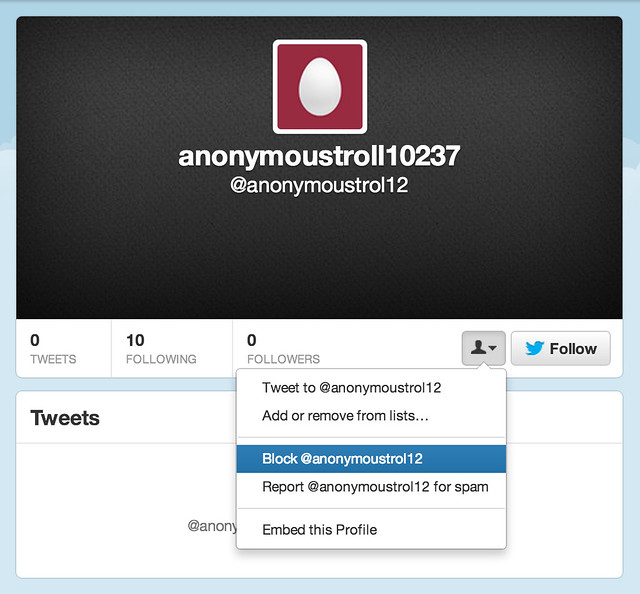Earlier today Twitter reversed their decision to change how user blocks are handled after a backlash reaction on their network.
From the Twitter blog:
“Earlier today, we made a change to the way the “block” function of Twitter works. We have decided to revert the change after receiving feedback from many users – we never want to introduce features at the cost of users feeling less safe. Any blocks you had previously instituted are still in effect.”
In a way, the current block at Twitter is sort of ineffective. If I block someone, the only thing it really does is prevent them from seeing my tweets when they are logged in (which also serves as notification to them that I’ve blocked them). They can still open up an unlogged-in version of Twitter (as easy as cmd-shift-N in Chrome, or cmd-shift-P in Firefox) and see everything I’ve tweeted publicly. Still, Twitter’s reversal shows that users really do care about blocking functionality and want more control and powerful blocking tools, not less.
I would argue that there are three key benefits that come from strong blocking tools on a social network.
1. Users feel empowered when they are more forcefully able to deal with harassment on a network. If someone is saying something offensive, why shouldn’t I personally be able to take control over that situation? If someone is making me uncomfortable, why shouldn’t I be empowered to deal with that for my own personal experience?
2. More effective blocking tools encourage more civil interaction. The thing that most trolls, haters, griefers, offensive jerks, etc. want on a social network is attention. By making it super easy to mute them or diminish them (especially by an intended target) it provides a disincentive for anti-social behavior in general.
3. Empowering users with blocking tools provides immediate relief for a user. Since oftentimes harassment is happening in real time, this can be more effective than waiting for customer service / community management reps at a social network to respond to reports of community violations. It is frustrating for a user to have to suffer even an additional 12 hours of harassment while a complaint works its way through to a community manager.
As far as best practices go, I’d hold up Google+ and Facebook as the networks that provide users the best blocking protection on the internet today.
Like Twitter, on Google+ and Facebook when you block someone they cannot see your public posts.
Google+ and Facebook take it one important step further though. Not only do they prevent someone you’ve blocked from seeing your public posts, they *also* filter the blocked user entirely out of your G+ or Facebook experience.
On G+ and Facebook when you block someone they become completely invisible to you everywhere on the network. It’s like they no longer exist in your social utopia.
That second block function is even more important than the first.
Flickr by contrast has some of the weakest blocking tools on the internet. When you block someone on Flickr, all it does is prevent them from private messaging you or commenting/faving your photos. Because of Flickr’s weak blocking tools, I’ve seen many of the most active, social accounts on Flickr leave due to harassment. This is bad design.
What makes harassment even worse on Flickr, is that (unlike G+ and Facebook) they allow anonymous troll accounts. So if a Troll1022 is harassing you anonymously on Flickr, and you report them, and three days later that account is deleted, all they need to do is set up Troll1023 and continue with the practice. Flickr’s weak blocking function allows virtually unlimited harassment on their network by anonymous trolls.
Protecting users and providing more control over your experience on a social network is important. It’s your most social and active users who will most likely sooner or latter run into friction. These are the users that any social network should be striving to empower.
I’m glad Twitter reversed their block policy after user reaction, and hope all networks realize how important the block feature is.


What features NOUNPLUS Grammar Checker can provide
For many years, Our team has developed English grammar check engine, which is now used for our Android free grammar checker app as well.
NOUNPLUS’s Grammar algorithm mainly focuses on two principles of Grammar, Syntax, and Morphology, identifying over 1,000 common grammatical mistakes.
Unlike many of the grammar correctors in the market, it does not provide spell check so that we can achieve better accuracy of understanding proper nouns However, you can still use spell checker by setting the browser’s preference.
http://www.nounplus.net
Hello there. Today the usage of ask. This is a pretty efficiently authored document. I will be certain to take note of that and are available to find out more within your helpful tips. Appreciation for your write-up. I will undoubtedly recovery.
Hey I am so happy I found your site, I really found you
by error, while I was browsing on Yahoo for something else, Regardless I am here now and would just like to say thanks a
lot for a fantastic post and a all round exciting blog (I also love the
theme/design), I don’t have time to read through it all
at the minute but I have saved it and also included your RSS feeds, so when I have time I will be back to read a great deal more, Please do keep up the great work.
Feel free to visit my blog post: sandy springs luxury apartment